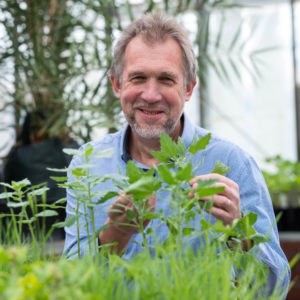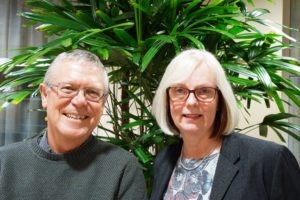Professor Sergey Shabala had his first exposure to the Australian plant science community nearly 23 years ago, while attending Combio in Sydney in 1995. Being raised under strict academic rules in the former USSR, I was probably the only person wearing a suit and a tie at that meeting (except perhaps a conference Chair who has removed it soon after leaving the podium). Equally shocking to me (in a cultural sense) was the first-named basis, and the fact that a PhD student can corner a Nobel Laureate and ask a question related to his work during the tea break. This was simply unthinkable in the system I was raised. Now, looking back at the beginning of my research career in Australia, I believe that this level of “liberalism” has become a catalyst that allowed me to develop my skills as an independent researcher and brought me to my current level. This view has been then reinforced by my own experience as a PhD supervisor and research mentor. Running a large (over 20 people) and truly multinational (11 nationalities) laboratory, I am dealing with various cultural aspects of research management on a daily basis. While the sample size is probably not big enough to draw an explicit conclusion, I have noticed that the sooner my students stop calling me Sir or Doctor and start using the first name, the quicker they integrate in the system, and develop their potential.
Over the same 23 years, I had a privilege to work with many of my colleagues (both in Australia and overseas); some of them became my role models and inspired me to become who I am now. The atmosphere of the friendship and openness and a true collaborative spirit has always been a hallmark of the Australian plant science community, and we need to ensure that these great traditions are maintained and passed to the future generation of Australian research leaders.
Another striking aspect of the Australian system was that our research is driven by curiosity, in a true spirit of the academic freedom. While we take it for granted, this is not true in many other places, especially in a corporate world. Therefore, I hope the spirit of a genuine research and an excitement of the moment discovering something novel, will prevail and overcome a pragmatism of the cost/benefit analysis and the recent corporate trends in academia. As a very least – I will do my best to convince my students and post-docs to share this view. Rephrasing one of my favourite books:
 “I might be only a small pebble on a way of this trend but I will do my best to at least slow it down (if not reverse)”. Is there anyone to join me on this quest?
“I might be only a small pebble on a way of this trend but I will do my best to at least slow it down (if not reverse)”. Is there anyone to join me on this quest?
Professor Sergey Shabala, Head, Stress Physiology Laboratory, School of Land and Food, University of Tasmania
President, Australian Society of Plant Scientists
One of the first ComBio meetings Professor Steve Tyerman attended was in Brisbane, late seventies just after completing his Honours research, where he travelled the coast with Richard Storey surfing along the way; a great way to attend a conference. At these ASPS (then ASPP) conferences Steve enjoyed meeting the scientists, putting faces to names, being able to chat, and getting to know the real characters of plant science. He says “It was nice to find out that they had other interests and hobbies like normal people…It is important to make time for other interests, in my case sailing, and my family of course. These conferences also established long term friends and mentors that have stood the test of time.”
The conferences have given him some amazing ideas from other fields, on how to carry out new experiments, help with statistics and even putting ideas together in a new synthesis. Many fruitful collaborations were also established; “I don’t think I ever said no to trying out something new to me with a new collaborator, it’s a weakness of mine”. These collaborations have sometimes developed into career long research hi-lights. The atmosphere has always been open to learning about new ways to tackle problems. One of his best papers came from ASPS and ComBio ideas. He looks back on attending conferences with fond memories, the mentoring, and researchers have always been kind when asking questions.
A mentor moment for Steve was seeing Rana Munns speak for the first time (“too long ago to put on a date”) and then being able to ask her a rather esoteric question about volumetric elastic modulus. “Never be afraid of asking questions!” One funny mistake Steve remembers of himself under the influence of pain killers and the flu, was talking obliviously; twice as long as his allocated time in a 15 min slot. He eventually, probably longer than many, managed to somewhat hone his presentations through experiences gained from ASPS conferences.
Steve believes strongly in the role of ASPS influencing researchers, students, industry and politicians. Students have to be nurtured to counter anti-science which is appearing in the general community and amongst our politicians. It is important to encourage a high level of knowledge and education in our society. An idea is to have primary and secondary teachers attending meetings so they can pass on the excitement of plant science to high school students and that “plants drive our livelihood”. Maybe then we will get more students coming to University who don’t think plants are boring.
A large chunk of Steve’s research is industry focussed, as Chair of Viticulture at the University of Adelaide. Recently his laboratory at the Waite Campus of Adelaide University, reported on how hypoxia develops in wine grape berries and that the berries “breathe” through lenticels on the berry stem, that if blocked can accelerate cell death in the berry. Implications for the Wine industry are to harvest before berry shrivel alleviating a problem where yields drop by 30 percent quickly and the high sugar concentration becomes problematic in the ferments. But now as Emeritus Professor he also looks forward to getting back to his patch-clamp rig and electrophysiology to tie up a few loose ends in basic transport research on his favourite proteins; aquaporin’s.

Professor Steve Tyerman, Chair of Viticulture at the University of Adelaide and Kathy Soole, Associate Professor Biochemistry and Biotechnology, College of Science and Engineering, Flinders University
Past President (2003-2007) and President Elect respectively, Australian Society of Plant Scientists
Kathleen (Kathy) Soole has been a member of the Australian Society of Plant Scientists since she was an Honours student and during her PhD studies at the University of Adelaide in the Botany Department, under the supervision of Prof. Joe Wiskich. Joe was a very active member of the Society during his career and encouraged his students to participate as well. He has been a major influence for Kathy throughout her career in science and through Joe and ASPS she had the honour to meet Bob Robertson, an eminent scientist and member of the Society as well as many other high profile plant scientists. It was very awe inspiring as a young student. When Joe was president, Kathy was Honorary Treasurer, a role she continued to hold for quite a few years (1998-2004). Impressively her postdoctoral research at the University of Newcastle –upon-Tyne and to this day as an Associate Professor at Flinders University, encompasses both plant and animal biochemistry. I catch her in between students for lunch in the newly refurbished Flinders University Café. This semester she is teaching Agricultural Biotechnology and she enjoys teaching as her students seem inspired.
Kathy feels very passionately about the society remaining a community where students and scientists are encouraged to take up and maintain their membership. She is proud of how the society actively fosters support for students and scientists. The society is the very basis of networking and is where we can look forward to seeing each other every year and she says “great friends have been made”.
When ComBio becomes biennial, having biennial Australian Society of Plant scientist conferences will further improve interactions between scientists and students. She envisions regional centres with lots of scientific energy will be ideal hosts. The society will also facilitate an international or national prominent scientist to talk at several meetings throughout Australia. This will provide great momentum for elevating plant science higher on national and global decision making agendas.
As a community of plant scientists we have to:
- Communicate to the wider community to realise the looming food crisis.
- Alleviate this crisis by delivering more efficient food.
- Strike a balance between ecology, biodiversity and food production. There needs to be a good balance between ecological biodiversity and food production through better communication between these areas of plant biology; Kathy recently attended a presentation at Flinders earlier this year by Prof. Andrew Balmford, a renowned ecologist from the UK was speaking about the balance between ecology and agriculture and moving ahead together for the benefit of the world.
- Educate the wider community about the benefit of plants to society, for example, try to give a balanced view about the use of genetically modified plants.
- Be at the forefront of coping and adapting to climate change.
- Up the numbers of members in the society.
- Promote science as a career among young people, especially young women and show them that it is possible to have life balance and a family life.
At Flinders, Kathy has a laboratory full of students researching the role of respiration and oxidative stress in the growth of arable crops, moving beyond Arabidopsis. Recently, she has joined labs with other long-term ASPS members; Prof. David Day and Assoc. Prof. Colin Jenkins, and it has proved to be a positive experience. It has enabled an expansion of recent activities into carbohydrate metabolism and legume research.
Our President Elect is exemplified by her important, current and fascinating research. She looks forward to the up-coming meeting and speaking to students and scientists at the poster sessions in Sydney, see you soon.
